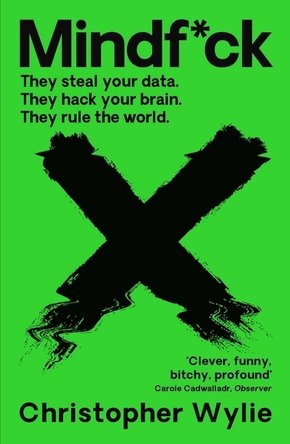
Mindf_ck - Inside Cambridge Analytica's Plot to Break the World
| Verlag | Profile Books |
| Auflage | 2020 |
| Seiten | 288 |
| Format | 14,8 x 19,9 x 1,9 cm |
| B Format Paperback | |
| Gewicht | 236 g |
| Artikeltyp | Englisches Buch |
| EAN | 9781788165006 |
| Bestell-Nr | 78816500UA |
Now in paperback. Christopher Wylie, the Cambridge Analytica whistleblower, tells the inside story of the data mining and psychological manipulation behind the election of Donald Trump and the Brexit referendum, connecting Facebook, WikiLeaks, Russian intelligence, and international hackers.
From whistleblower Christopher Wylie, the definitive story of the Brexit coup, the making of Bannon's America, and an ongoing crime against democracy
§'Please please please read Mindf_ck' - Richard Dawkins
What if you could peer into the minds of an entire population? What if you could target the weakest with rumours that only they saw?
In 2016, an obscure British military contractor turned the world upside down. Funded by a billionaire on a crusade to start his own far-right insurgency, Cambridge Analytica combined psychological research with private Facebook data to make an invisible weapon with the power to change what voters perceived as real.
The firm was created to launch the then unknown Steve Bannon's ideological assault on America. But as it honed its dark arts in elections from Trinidad to Nigeria, 24-year-old research director Christopher Wylie began to see what he and his colleagues were unleashing.
He had heard the disturbing visions of the investors. He saw what CEO Alexander Nix did behind closed doors. When Britain shocked the world by voting to leave the EU, Wylie realised it was time to expose his old associates. The political crime of the century had just taken place - the weapon had been tested - and nobody knew.
Rezension:
An invaluable primer on psychological warfare and behaviour modification ... Given that Wylie was at the heart of this work, and that he displayed real sociological understanding of what the data was revealing, his account provides a useful, crystal-clear exposition of the power of psychographic profiling when it's done right. The Observer
